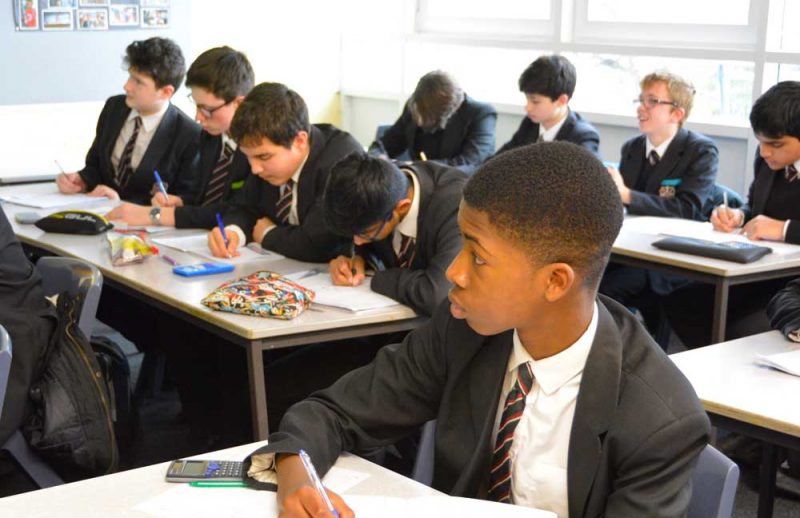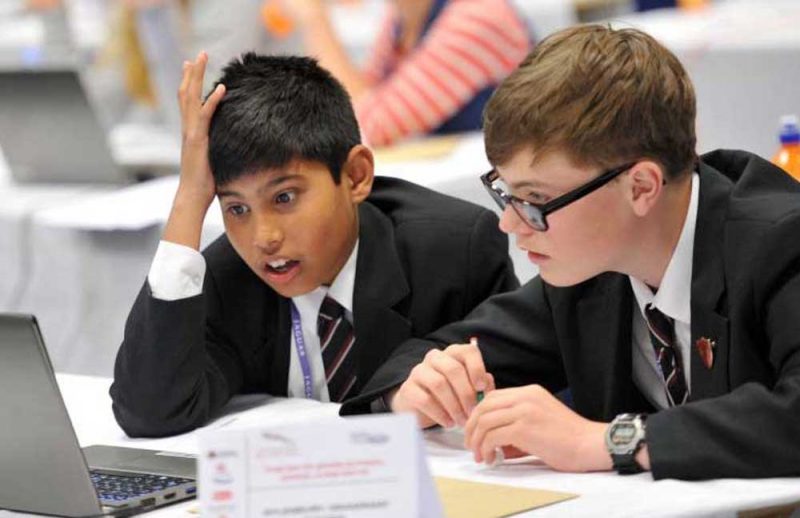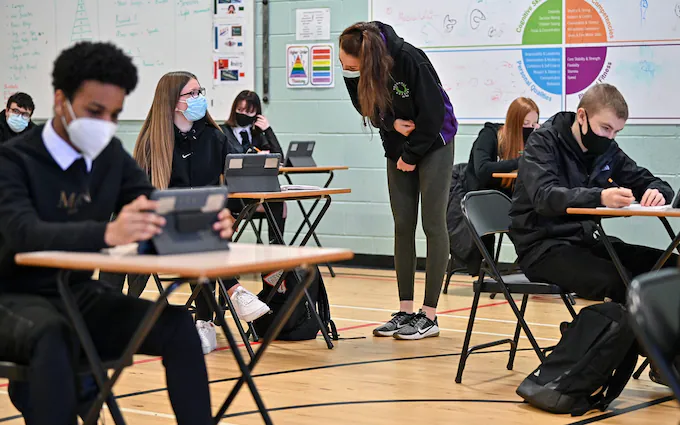At 16 years old in England, students typically take exams known as GCSEs (General Certificate of Secondary Education). These exams cover core subjects such as English Language and Literature, Mathematics, and Science (including Biology, Chemistry, and Physics).
Additionally, students may choose optional subjects based on their interests, including History, Geography, Modern Foreign Languages, and others. GCSE exams assess students‘ knowledge, understanding, and skills in each subject area through a combination of written papers, practical assessments, and coursework.
Successfully passing GCSE exams is important as it provides a foundation for further education or employment opportu
General Qualification

General Qualifications at the age of 16 in England primarily revolve around the General Certificate of Secondary Education (GCSE). GCSEs are standardized examinations taken by students typically at the end of their compulsory education, marking a significant milestone in their academic journey.
Further, these qualifications hold immense importance as they serve as a foundation for further education or employment opportunities. It covers a wide range of subjects. For example, English Language and Literature, Mathematics, Science (often comprising separate Biology, Chemistry, and Physics exams), Humanities, Languages, and various other optional subjects.
Additionally, the curriculum for each subject offers students a comprehensive grasp of key concepts, skills, and relevant knowledge in the respective field. The assessment methods for GCSEs vary depending on the subject but commonly include a combination of written examinations, coursework, and practical assessments.
Written exams typically assess students’ ability to recall information, apply knowledge to different scenarios, and demonstrate critical thinking skills.
The curriculum for each subject offers students a comprehensive grasp of key concepts, skills, and relevant knowledge in the respective field. Achieving good grades in GCSEs opens doors to various post-16 educational pathways, including A-levels, vocational qualifications, or apprenticeships.
These qualifications not only provide academic recognition but also help students develop transferable skills such as problem-solving, communication, and time management. These skills are valuable for their future endeavors.
Other Assessment Methods

In addition to traditional examinations, students in England may undergo various other assessment methods to evaluate their academic progress. These assessments are designed to gauge their attainment at the age of 16.
These alternative assessment methods complement the examination process and provide a more holistic understanding of students’ abilities. Some of these methods include:
Coursework
Coursework involves completing assignments, projects, or practical tasks throughout the academic year. It allows students to demonstrate their understanding of a subject in a more extended and in-depth manner.
Also, it is commonly used in subjects such as English, History, Geography, and Design & Technology, It contributes to the final GCSE grade and provides opportunities for students to showcase their research, analytical, and creative skills.
Controlled Assessment
Good to know, controlled assessment tasks are similar to coursework but are conducted under controlled conditions within the classroom. They typically involve practical activities or investigations that assess specific skills and knowledge outlined in the curriculum.
Besides, this tasks are designed to ensure fairness and consistency in assessment across different schools. Subjects like Science often include controlled assessment tasks to assess students’ practical skills and scientific knowledge.
Practical Assessments
Practical assessments evaluate students’ ability to apply theoretical knowledge and practical skills in real-world scenarios. They are commonly used in subjects such as Science, Design & Technology, and Performing Arts.
Moreover, it may involve conducting experiments, designing prototypes, or performing musical or dramatic pieces. They assess students’ problem-solving abilities, practical competence, and understanding of subject-specific principles.
Speaking and Listening Assessments
Some subjects, particularly English Language and Modern Foreign Languages, include assessments of students’ speaking and listening skills.
These assessments may involve presentations, debates, discussions, or oral examinations. They assess students’ ability to communicate effectively, articulate ideas, and engage in meaningful interactions.
What exams are typically taken at age 16 in England?

At the age of 16 in England, students typically take specific exams as part of their General Certificate of Secondary Education (GCSE) qualifications.
These exams cover a range of subjects, each with its own assessment criteria and examination format.
Here’s an overview of the specific exams commonly taken at this stage:
English Language and Literature
These exams assess students’ reading, writing, and analytical skills. Components may include comprehension tasks, essay writing, and analysis of literary texts.
Mathematics
Mathematics exams evaluate students’ ability to solve mathematical problems, apply mathematical concepts, and interpret data. Topics covered may include algebra, geometry, statistics, and probability.
Science
Science exams often comprise separate papers for Biology, Chemistry, and Physics. They assess students’ understanding of scientific principles, experimental skills, and knowledge of key scientific concepts.
Optional Subjects
Students may choose additional subjects based on their interests and career aspirations. Common optional subjects include History, Geography, Modern Foreign Languages (e.g., French, Spanish), Computer Science, Art and Design, and Physical Education.
Other Vocational Qualifications
In addition to GCSEs, students may pursue vocational qualifications in subjects such as Business Studies, Information and Communication Technology (ICT), Health and Social Care, and Design & Technology. These qualifications provide practical skills and knowledge relevant to specific industries or career pathways.
Practical Assessments and Coursework
Some subjects, particularly Science and Design & Technology, include practical assessments and coursework components. Practical assessments may involve conducting experiments, investigations, or practical tasks, while coursework requires students to complete extended projects or assignments.
Speaking and Listening Assessments
Subjects like English Language and Modern Foreign Languages may include assessments of students’ speaking and listening skills. These assessments may involve presentations, discussions, debates, or oral examinations.
External Examinations
Most GCSE subjects culminate in external examinations set and marked by examination boards approved by the government. These exams are typically taken at the end of the two-year GCSE course, usually in May or June.
What are common post-GCSE options for 16-year-olds?

After successfully tackling their GCSEs, 16-year-olds in England have a few exciting pathways to choose from. Here’s a breakdown of the most common post-exam options:
A-Levels (Advanced Levels)
This is a traditional academic route for students aiming for university entrance.
A-Levels typically involve studying three or four subjects in greater depth for two years. Strong performance in relevant GCSEs is usually required for acceptance into A-level programs.
Also, A-Levels are well-regarded by universities and provide a strong foundation for various degree programs.
BTECs (Business and Technology Education Councils)
BTECs are vocational qualifications that offer a more practical and career-oriented approach after GCSEs. They can be taken at different levels (Level 2, Level 3) and cover a wide range of industry sectors, like engineering, business, healthcare, and hospitality. BTECs can lead directly to employment or higher education courses related to the chosen field.
T Levels (Technical Levels)
Introduced more recently, T Levels are another vocational option offering a blend of classroom learning and workplace experience. They are two-year programs focusing on specific industry areas and combine classroom instruction with on-the-job placements. Successful completion of T Levels can lead to skilled employment or higher education opportunities in the chosen field.
Apprenticeships
Apprenticeships combine work-based learning with structured training, allowing individuals to earn while they learn a specific trade or profession.
Moreover, many employers offer apprenticeships in various sectors, such as construction, engineering, IT, and healthcare. Entry requirements for apprenticeships can vary, but strong GCSE grades in relevant subjects are often beneficial.
Further Education (FE) Colleges
FE colleges offer a diverse range of courses beyond A-Levels or BTECs Students can pursue vocational qualifications, foundation courses to prepare for university studies, or specialized training programs in various fields. FE colleges provide a flexible learning environment with smaller class sizes and more personalized support.
Employment
Some 16-year-olds may choose to enter the workforce directly after their GCSEs. This option might involve full-time or part-time employment while gaining valuable work experience and potentially pursuing further qualifications part-time.
Conquering GCSEs Top Tips for Exam Preparation
GCSE exams are a crucial milestone in your educational journey. Here are some effective strategies to help you ace your exams:
Craft a Revision Schedule
Map out your study plan well in advance, allocating time for each subject based on difficulty and exam dates. Break down large topics into manageable chunks for daily or weekly revision goals. Be realistic about your pace and incorporate breaks to avoid burnout.
Organize Your Study Materials
Gather all your textbooks, class notes, revision guides, and past papers. Create a dedicated study space that’s quiet, well-lit, and free from distractions. Organize your notes using color coding, mind maps, or flashcards to enhance memorization.
Go Beyond Passive Reading
Don’t just passively reread your notes. Engage in active recall by summarizing key points in your own words, creating practice questions, or explaining concepts to a friend. This helps solidify understanding and identify areas needing more focus.
Practice Makes Perfect
Utilize past papers and mock exams extensively. Simulate exam conditions by setting timers and completing questions under pressure. Analyze your performance, identify recurring mistakes, and use them as learning opportunities.
Explore Different Learning Styles
Discover what works best for you: visual learners may benefit from diagrams and mind maps. Auditory learners may benefit from recordings or group discussions. Kinesthetic learners may benefit from practical exercises.
Seek Help When Needed
Don’t hesitate to clarify doubts with teachers, tutors, or classmates. Take advantage of school resources like revision workshops or study groups for collaborative learning.
Maintain a Healthy Balance
Prioritize a healthy sleep schedule, nutritious diet, and regular exercise to stay physically and mentally energized throughout your preparation. Schedule breaks to avoid information overload and manage stress levels.
Stay Positive and Motivated
Set realistic goals and reward yourself for achieving them. Visualize your success and maintain a positive attitude throughout the preparation process.
FAQ’s
Does school finish at 16 in the UK?
Yes, In the UK, students can leave school on the last Friday in June if they’ll be 16 by the end of the summer holidays. However, they must then continue in full-time education, start an apprenticeship, or pursue other approved options until they’re 18.
What national examination do students take at the age of sixteen in the UK?
At the age of sixteen in the UK, most students take GCSEs (General Certificate of Secondary Education) exams in nine subjects, following a two-year course in English state schools.
Final Words
GCSE exams are a big deal for 16-year-olds in England. These tests in subjects like English, Maths, and Science show how much they’ve learned. Doing well in GCSEs sets them up for more school or finding a job later on.
With hard work and getting ready, students can prove what they know and can do. GCSEs help them move forward toward their dreams, whether it’s more learning or starting a career.
It’s a big step towards reaching their goals and making a difference in the world.
